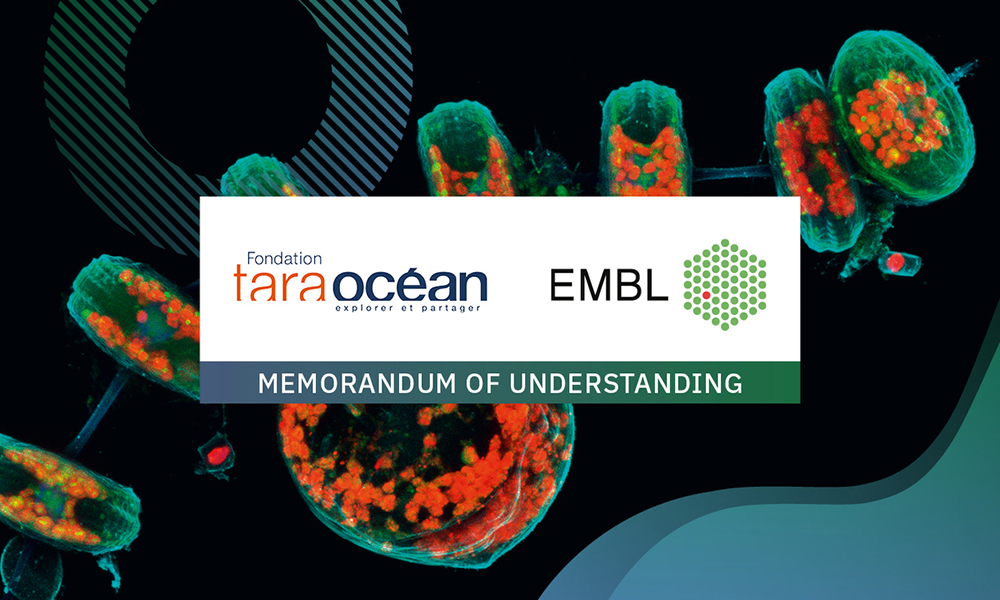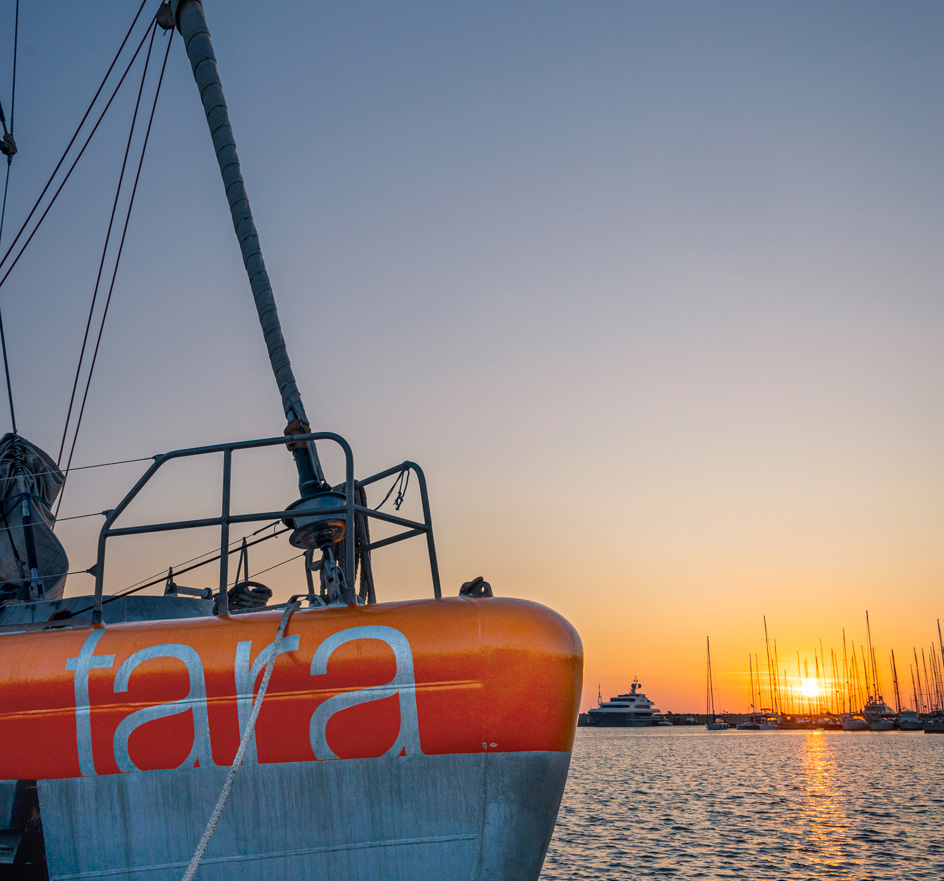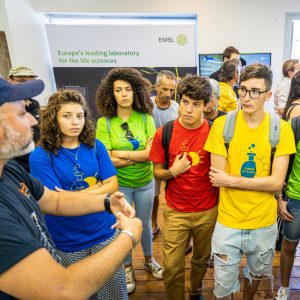
Read the latest Issue
Collaboration sets course for future joint endeavours to explore molecular connections between ocean and humankind

Whether it’s tracking the impacts of widespread microplastics, understanding plankton ecosystems in the context of climate change, or cataloguing the ocean’s microbes, EMBL and the Tara Ocean Foundation have been collaborating with one another since the schooner Tara set out on the Tara Oceans expedition in 2008, led by EMBL alumnus Eric Karsenti as the expedition’s scientific director. Now they’ve formalised this relationship with a memorandum of understanding (MoU) that will further expand their ability to take on collaborative projects.

“We’ve already seen how many incredible discoveries this partnership has enabled, so taking it to this next level will allow us to join forces in multiple new endeavours to provide molecular insights into ocean biodiversity,” says EMBL Director General Edith Heard, noting specifically Mission Microplastics in 2019, when EMBL joined the Tara Ocean Foundation to promote the science at European ports of call. “Whether it’s the emergence of new viruses, the spread of antibiotic resistance, or the impact of widespread microplastics in the ocean, departing from the lab to explore microbial dynamics in natural habitats adds an essential dimension to our understanding of life and the impact man has had on this planet.”
The Tara Ocean Foundation is a not-for-profit public interest foundation based in Paris, and organises voyages to study the impact of climate change and the ecological crisis facing the world’s oceans. In addition to the research it helps facilitate with its at-sea platform, the foundation co-organises events and press conferences on board its schooner with EMBL and other relevant stakeholders and partners, raises awareness in education, and plays a growing role in ocean advocacy across numerous fields of expertise by engaging with policymakers in France and Europe, and with the United Nations.
By going beyond the laboratory to study organisms in their natural habitats, EMBL can add an additional dimension to the world-class molecular biology research it is known for. This will form part of EMBL’s work on Planetary Biology – one of the new transversal research themes that EMBL is developing.
“This MoU will expand how the two organisations can work together to study the complex interactions of microbes, plants, and animals in responding to environmental change in the ocean at molecular, cellular, organismal, and population levels,” says Romain Troublé, Executive Director of the Tara Ocean Foundation.

The research carried out at sea with the Tara schooner is part of a much broader approach that EMBL is taking in its next research Programme, due to start in 2022. The new Programme will help to address some of the world’s most pressing and complex issues, such as climate change and the emergence of new pandemics, by providing new and important perspectives at the molecular level.
Ultimately, the scientists want to understand how all the building blocks of life function in the context of their environment.
This MoU improves the ability of the Tara Ocean Foundation and EMBL to work together on several levels – from research endeavours and joint funding opportunities to community outreach and policy initiatives.
Qu’il s’agisse de suivre les effets de la diffusion des microplastiques, de comprendre les écosystèmes planctoniques dans le cadre du changement climatique ou de cataloguer le microbiome marin, l’EMBL et la Fondation Tara Océan travaillent ensemble depuis 2008 sur l’expédition Tara Océans, sous la direction scientifique d’Eric Karsenti, ex-chef de Groupe de l’EMBL.
Aujourd’hui, les deux organisations formalisent cette relation grâce à un protocole d’entente (MoU) qui amplifiera encore cette capacité mutuelle à entreprendre des projets communs.
“Nous avons déjà prouvé la richesse des recherches issues de notre collaboration et l’amplifier permettra de documenter davantage ce que nous savons sur l’Homme et notre relation à la planète”, déclare Edith Heard, directrice générale de l’EMBL, lors de la Mission Microplastiques en 2019, alors que l’EMBL et la Fondation co-organisaient les escales européennes. “Les problèmes complexes ne surgissent pas de nulle part. Qu’il s’agisse de l’émergence de nouveaux virus, du développement de la résistance aux antibiotiques ou des impacts des microplastiques présents dans l’océan, le fait de sortir du laboratoire pour explorer la dynamique microbienne dans les habitats naturels ajoute une dimension essentielle à notre compréhension de la vie et de l’impact de l’Homme sur la planète.”
La Fondation Tara Océan est la première fondation française reconnue d’utilité publique sur l’Océan, qui depuis 17 ans organise des expéditions scientifiques pour étudier l’impact du changement climatique et de la crise écologique sur l’Océan. Outre les recherches qu’elle contribue à faciliter grâce à sa goélette Tara, la Fondation co-organise avec l’EMBL, et ses partenaires, de nombreux événements de sensibilisation du grand public et tient une place importante dans l’éducation des générations futures. Elle joue par ailleurs un rôle croissant dans la défense de l’Océan dans de nombreux domaines d’expertise aux niveaux français, européen et des Nations Unies.
En allant au-delà du laboratoire pour étudier les organismes dans leurs habitats naturels, l’EMBL apporte son expertise de classe mondiale en biologie moléculaire et cellulaire à la recherche internationale en écologie, et à l’interface environnement / santé humaine.
C’est l’essence du déploiement de l’EMBL sur Planetary Biology – l’un de ses nouveaux thèmes de recherche transversaux.
“Ce protocole d’accord élargira la façon dont nos deux organisations peuvent travailler ensemble afin d’étudier les interactions complexes des microbes, des plantes, des animaux, et de l’Homme en réponse aux changements environnementaux de l’océan aux niveaux moléculaire, cellulaire, organisationnel. Il n’y a qu’une seule santé sur cette planète, elle est globale. ” déclare Romain Troublé, directeur général de la Fondation Tara Océan.
Les recherches menées en mer avec la goélette Tara font partie d’une approche plus large que l’EMBL adoptera dans son prochain programme de recherche qui débutera en 2022. Il contribuera à résoudre certains des problèmes les plus urgents et les plus complexes actuels, tels que le changement climatique et l’émergence de nouvelles pandémies, en offrant des perspectives nouvelles et importantes au niveau moléculaire.
En définitive, les scientifiques veulent comprendre comment tous les éléments constitutifs de la vie fonctionnent dans leur environnement.
Ce protocole d’accord améliore la capacité de la Fondation Tara Océan et de l’EMBL à travailler ensemble à plusieurs niveaux, depuis les projets de recherche et leurs financements conjoints jusqu’à la sensibilisation du grand public et aux initiatives politiques.
Looking for past print editions of EMBLetc.? Browse our archive, going back 20 years.
EMBLetc. archive